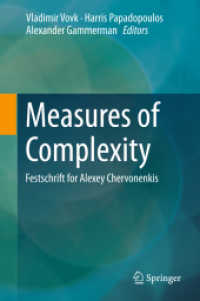- ホーム
- > 洋書
- > 英文書
- > Science / Mathematics
Full Description
Analytical chemistry today is almost entirely instrumental analytical chemistry and it is performed by many scientists and engineers who are not chemists. Analytical instrumentation is crucial to research in molecular biology, medicine, geology, food science, materials science, and many other fields. With the growing sophistication of laboratory equipment, there is a danger that analytical instruments can be regarded as "black boxes" by those using them. The well-known phrase "garbage in, garbage out" holds true for analytical instrumentation as well as computers. This book serves to provide users of analytical instrumentation with an understanding of their instruments.
This book is written to teach undergraduate students and those working in chemical fields outside analytical chemistry how contemporary analytical instrumentation works, as well as its uses and limitations. Mathematics is kept to a minimum. No background in calculus, physics, or physical chemistry is required. The major fields of modern instrumentation are covered, including applications of each type of instrumental technique.
Each chapter includes:
A discussion of the fundamental principles underlying each technique
Detailed descriptions of the instrumentation
An extensive and up-to-date bibliography
End of chapter problems
Suggested experiments appropriate to the technique where relevant
This text uniquely combines instrumental analysis with organic spectral interpretation (IR, NMR, and MS). It provides detailed coverage of sampling, sample handling, sample storage, and sample preparation. In addition, the authors have included many instrument manufacturers' websites, which contain extensive resources.
Contents
Chapter 01
Concepts of Instrumental Analytical Chemistry
Chapter 02
Introduction to Spectroscopy
Chapter 03
Visible and Ultraviolet Molecular Spectroscopy
Chapter 04
Infrared, Near-Infrared, and Raman Spectroscopy
Chapter 05
Magnetic Resonance Spectroscopy
Chapter 06
Atomic Absorption Spectrometry
Chapter 07
Atomic Emission Spectroscopy
Chapter 08
X-Ray Spectroscopy
Chapter 09
Mass Spectrometry
Chapter 10
Principles of Chromatography
Chapter 11
Gas Chromatography
Chapter 12
Chromatography with Liquid Mobile Phases
Chapter 13
Electroanalytical Chemistry
Chapter 14
Thermal Analysis








